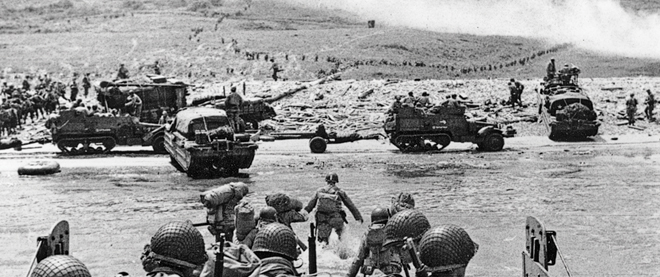A Canadian veteran’s peacock moment on D-Day
John Trafford swept Omaha Beach for mines before the U.S. soldiers came ashore
Fox Photos/Getty Images
Share

When John Trafford of Belleville, Ont., searched his memory for his proudest Canadian moment, he found an experience that needed no lyrical flourishing, no elaboration; the facts spoke for themselves. “On D-Day, June 6, 1944, I was serving in HMCS Mulgrave, a ship of the 31st Minesweeping Flotilla of the Royal Canadian Navy approaching Omaha Beach,” he wrote to Maclean’s, and left it at that.
Weeks later, Trafford died of a heart attack. At 91, his death was sudden and unexpected. Even as a nonagenarian, Trafford cycled 30 km per week. “For heaven’s sake, he was a goer. He was a mover and shaker,” laughs Elsie, 92, Trafford’s widow. They met in Toronto through Elsie’s brother-in-law, and were married there 68 years ago (“69 years in August,” sighs Elsie) while Trafford was on a one-week special leave from the Royal Canadian Navy. After the war, they moved from Toronto to Belleville in the late 1950s, where Trafford worked as an area manager for typewriter-maker Underwood. In the early 1970s, he took a job with the federal correctional services before retiring in 1986 at 65.
Like so many of his compatriots, Trafford enlisted in the Navy just days after Britain, and then Canada, declared war on Germany in 1939. Before long, Trafford was stationed on the East Coast, where he was assigned to serve on the naval convoys that protected vital supply routes to Britain from the menaces of German U-boats. It was a tough slog in the North Atlantic. “He said, ‘You never got dry and you never got warm,’ ” recalls Trafford’s son David, 64.
On D-Day, when the Allies invaded Nazi-occupied France from the beaches of Normandy, Trafford and his shipmates stealthily deactivated German mines in the waters off Omaha Beach, where American soldiers landed hours later. “That was his peacock moment,” says David, chuckling. “He always rubbed it in to American veterans when he could, that we had to sweep Omaha Beach before they could go in.”